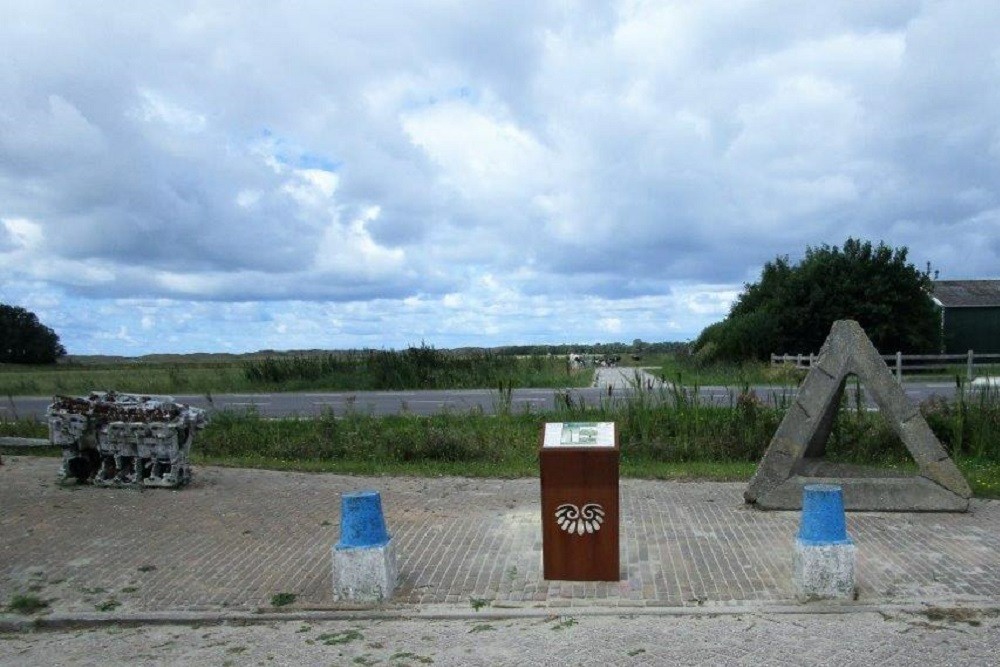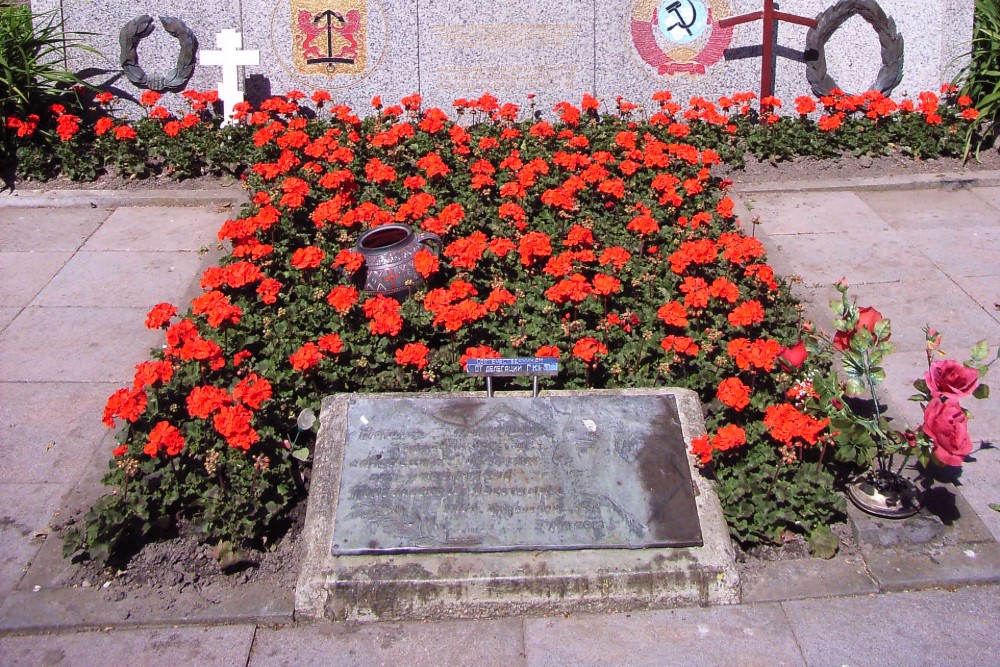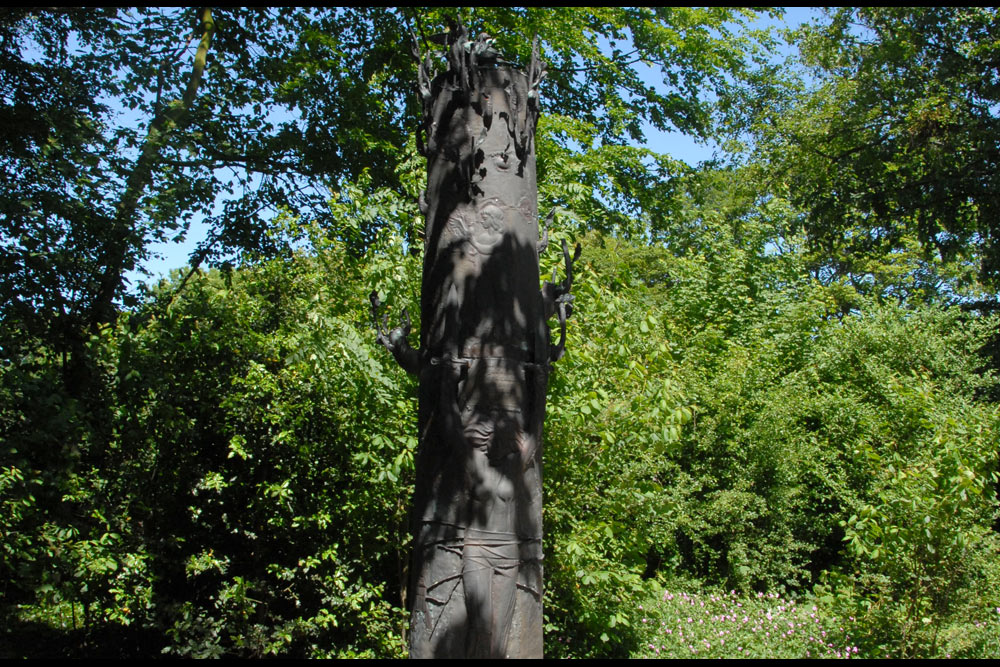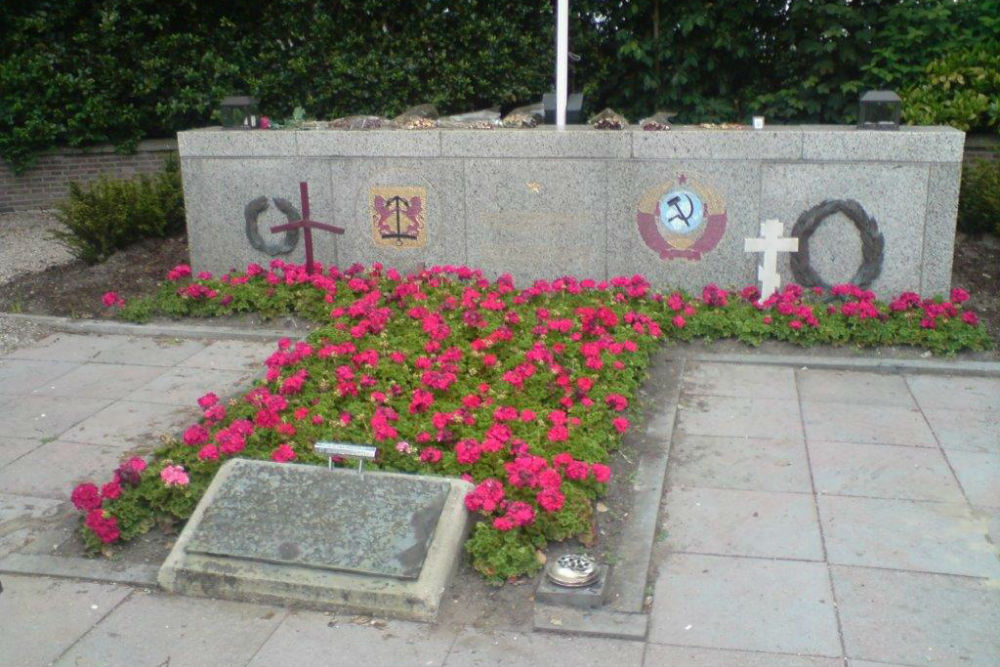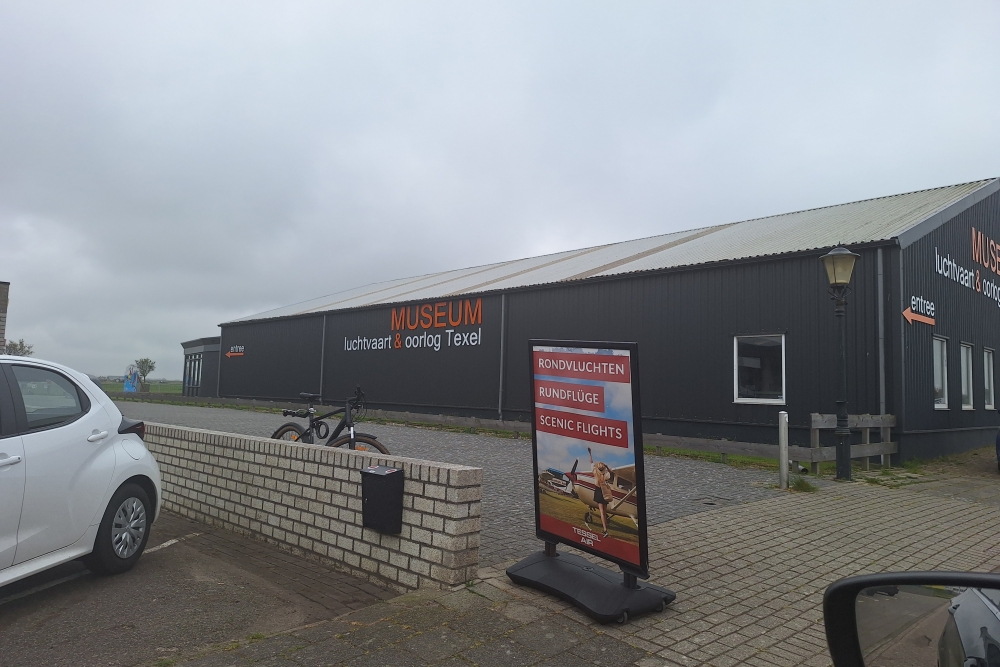Catrien from Texel, letters about the Georgian rebellion
The following story is an eyewitness account of the Texel tragedy. It is a relatively unknown uprising of Georgians stationed on the island against the Germans between 6 and 26 April 1945.
This letter was written by a relative of my grandfather, and I (Ernst Jan Jonkers) have not changed anything about the letter which was originaly written in Dutch.
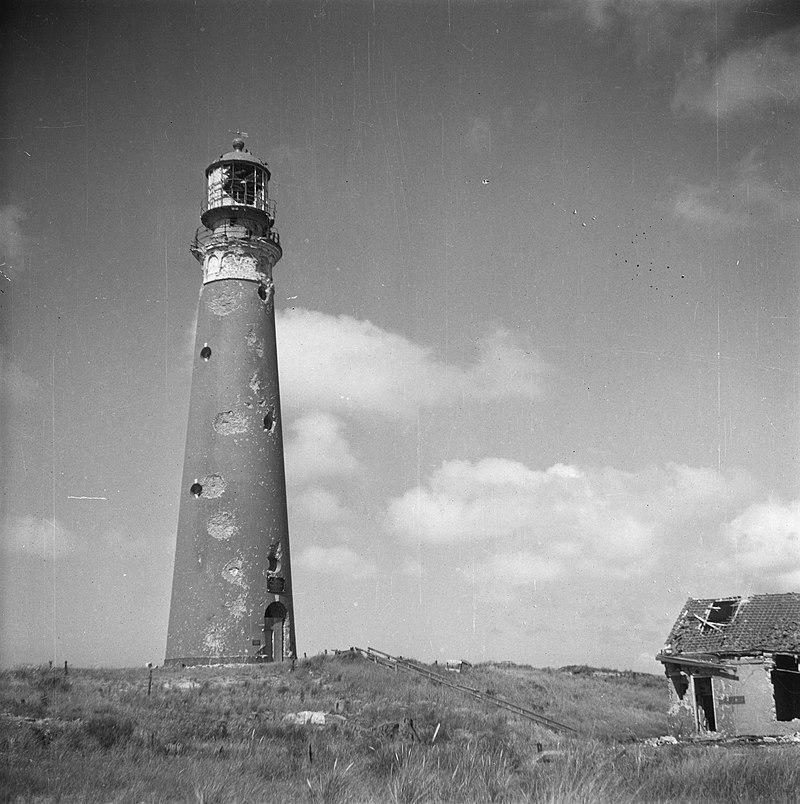
The lighthouse of De Cocksdorp on Texel damaged during fighting between Georgians and Germans. Source: Nationaal Archief
Den Burg, 10 May 1945.
Dear Catrien and Grandma,
It has been five long and anxious years since our country was maliciously invaded by the Germans in the early hours of 10 May. For several days now Texel has been anxiously awaiting the arrival of our liberators. We can expect the Canadians at any time. Our tricolour had been flying from almost every building for days, along with the orange that symbolised our liberation. While Friday, 29 March was a day of celebration in many households here as the rest of the exiles returned, a week later, on 6 April, there was deep mourning and dejection in many households. Unfortunately we did not escape, and Theo Joos’ sister Thea was killed in the heavy bombing of Den Burg. We ourselves were unharmed and, miraculously, our houses suffered little or no damage. Only Thea’s house, or rather the house she lived in, was hit in the kitchen, destroying everything, blowing out the back of the roof and leaving no window in one piece. Thea was wounded in our house by a piece of shrapnel in her forehead so badly she lost consciousness, bled profusely and she never woke up. She passed away 24 hours later.
On the night of 5 - 6 April we were awakened by the constant barrage of rifle and machinegun fire in and around Den Burg. We could only think of night exercises by the troops stationed here. At least I could think of no other explanation, and as the fighting was not in our avenue, we went back to sleep. Early the next morning we were informed that most of Texel was in the hands of the Russians (they must be Georgians), and we were liberated. Only the coastal batteries and the MOK were still in German hands, but this would also not be for long. Moreover, this action was not limited to Texel, but had also taken place from Den Helder to Zandvoort. At first I could hardly believe it, but it did not take long to convince me. Bodies of German soldiers lay around the maritine school, and everywhere you looked there were Russians armed to the teeth. I myself was far from reassured about the batteries still in German hands, and whether it was a true that Den Helder would also be in the hands of the Russians. Everywhere in Den Burg where there were Germans, there was fighting that night. In the morning a number of civilians, including uncle Visser, were more or less seriously injured by rifle bullets. In the afternoon, around 14:00, Thea had joined us with the intention of staying with us. Den Burg was cleared of Germans, and for the time being everything was quiet. At about 23:00, the bunkers at the Texla Residence, just outside of Den Burg on the road, came under fire from the southern battery. There were several hundred civilians there at the time, summoned because they were the leaders of the Russian resistance movement. As there were already been some wounded, I went there with bandages, and I was on my way back to Den Burg to retrieve some stretchers when the shooting started, and I had to take cover about five times.
Rumours were circulating in Den Burg that our hometown was going to be shelled, but hardly anyone believed them. Nobody knew where the rumours were coming from, and everyone was so excited that it could turn into panic. We were sitting quietly at home drinking tea, Frans van Ingen had just visited us, when suddenly, at about 16:00, the first shells started to fall. It rained shells for 20 minutes. In that relatively short time they managed to fire 1,800(!) shells at Den Burg.
There was nowhere to crawl and not much time to get to our shelter, a fireproof garden shed. The bullets landed next to us, a shower of dust fell behind us, and soon a house was in flames. As we felt the house was no longer safe, there was nowhere else to go. We went to our scullery for a short time with the intention of going to the aforementioned shelter, a one-and-a-half stone walled shed with a reinforced concrete roof and an armoured door. We did not see Frans van Ingen again that night, as he had rushed out by the front door. I had warned my housemates to come with me immediately on my signal. When I thought it was time, we fled through the scullery, across the garden and into the shed. To my horror, I realised that only Joos and Erie had followed me, leaving Auntie Thea and Mieke behind. Moments later Mieke came through with the news that Auntie had collapsed and was bleeding badly. Although the shelling continued I went back again a little later and found Thea in the scullery with a shrapnel wound in her forehead above her left eye. She was unconscious, bleeding profusely and vomiting all the time. I had been running around all day with bandages in my pocket and managed to put one on quickly, but it was soaking wet again. I returned to the house and went upstairs to get more bandages and a pillow from the medicine cabinet. Bandaging again. As it was too dangerous to stay, I carried Thea in my arms and stumbled through the garden with her for the third time, for it was not easy, and I arrived at the shed with her unharmed. Soon after that the shelling stopped, and German troops came into Den Burg looking for Russians. Rifle and machinegun fire could be heard in various locations around Den Burg. Fifteen minutes later I received medical attention, but as I said, there was nothing to be done. A stretcher was retrieved from the former Wehrmachtheim in our neighbourhood, which had been converted to a barracks to carry Thea to the field hospital. About 24 hours later she passed away.
With so many people leaving the village, Joos and the two girls crossed the country, not knowing where they were heading. After inspecting the damage to our house, the middle window, the bedroom, and some windows in the conservatory were broken, as well as about forty roof tiles on one side. After temporarily closing the windows, I looked for my wife and children and soon found them with a family in the Veen, a 20-minute walk from Den Burg. As the farms around Den Burg were overcrowded, like this one, we spent the night there, sleeping on the floor and slumped in a chair. Early the next morning we went to the Van Ingen family’s home, this part of Den Burg had not been damaged at all, only the centre was badly damaged. We stayed with the Van Ingens for about three days, trying to talk some sense into them, I managed to secure Joos and the children, and I was able to act when necessary. First a visit to the field hospital, Thea’s condition had not changed. Then I went home to nail it up as best as I could, because other open houses were being robbed of their contents, mainly by reinforcements recruited from the other side. The bastards broke in everywhere and took everything that was edible or to their liking. They also took the opportunity to change their clothes. Valuable items were taken. Everywhere in Den Burg there was great devastation, and the streets were blocked by the rubble of the collapsed houses. Work was underway to recover the victims, while the seriously injured had already been helped the night before. Some doctors had come from Den Helder to help.
There were 44 casualties in the first few days. This number continued to rise over the next 14 days, and shrapnel victims are still dying in the hospital.
Given the extensive material damage, it was a miracle that there were not more casualties, three or four members of some families died. The Russians had now retreated to the polder and the war continued there and in the dunes for another 14 days. In all, there were 800 Russians here. The polder was bombarded from the batteries and cannons, again causing casualties, while about 30 farms were destroyed or set on fire. The Waal and the Cocksdorp were also attacked, fortunately with fewer casualties. We now know what war is, and we had our fair share of it. After 14 days of fighting back and forth, most of the troops have left. Much was stolen and deliberately destroyed in the polder. Casualties on the German side were high, with 465 dead and many wounded. The Russians all proved to be skilled sharpshooters. If you could see a piece of a Kraut, he would have been dead already.
Sometimes we even receive reports that a few Krauts have been shot somewhere on Texel, by Russians wandering around here and there, because a few have stayed behind. They certainly work like a red rag on a bull, whereas most of the Russians walking around at least wear civilian clothes during the day. The arrival of the Canadians will probably put an end to this. It is time to get rid of that burden, because so far they are still walking around armed, although we hardly see that in Den Burg anymore. As far as these Russian actions are concerned, some citizens have been taken away by the Germans and probably shot. We know about some of them, but people are still unsure about another group of 11 people. So far, people have not found out what happened to them, and among them are various people who were innocently dragged off the street and taken away. A total of 350 houses in Den Burg were damaged, 50 were destroyed, 100 were partially destroyed, and 100 have suffered relatively minor damage. Considering the damage to property, it is a miracle that there are no more victims to mourn, and that several people were found under the rubble without serious injuries. If a Russian had been discovered in the first 14 days, the house or shed would simply have been set on fire. Fortunately, the final conclusion for Texel also came soon after, because if the Krauts had had four more weeks, then we would have had more victims of their terror to mourn. At least the gendarmerie would have at least been busy trying to find out everything. Thankfully, we have now lost that burden and are working on the final stage. The underground is on the move here. The homes of the NSB leaders[1] have been searched. They will be arrested as soon as the Allies arrive.
Sunday, May 13
Apart from a Dutch liaison officer, we have not seen any Canadians so far. They are due to arrive tomorrow morning. It is about time, because all last week nobody has done anything a blow, everything went like clockwork. Gates of honour and flags were popping up, and all the streets were decorated. The whole population was eagerly awaiting the liberators in celebration.
If there had been no 6 April, Texel would have emerged unscathed. It is now a date never to be forgotten. We have received your last letter on 5 Apri, and it was indeed an ugly albeit happy mistake for Grandma, who would have fallen down the stairs. I received this message by telephone from Harlingen to the Vos family in Assen, who had received your message. Later I found out that it was a postcard from my family in Hadding Street and that my aunt had been in an accident there. I spent another week with the Ypma family in Harlingen, so they must have received my letter from there. Still, I was very happy to be home when this misfortune occurred. To this date those in Assen have stayed behind, and about 12 men are still not at home. I will write about this and that in as much detail as possible, so that you have somewhat an overall impression of everything what had happened here in recent weeks. So as not to repeat myself, I would ask you to pass on these details as much as possible to our mutual acquaintances in your neighbourhood. If it is not too much trouble for the Robertus family as well. There is still much to be done. Every day is different, so that there is little time left to contact everyone at least in detail. I will gladly make an exception for you. It is currently a midsummer’s day and we all are looking for as much shade as possible. It is too warm in the sun. I hope that the mail connection with the rest of the country will be restored soon, because it leaves a lot to be desired at the moment. We have still not heard from Joos’ brother in Medemblik, I myself have written about 5 times, and that is not so far from here. How is everything in Groningen, is there still resistance or have there been no acts of war? We are unusually curious about further news. This is also the case with Vries and Assen as well. Catrien, have you already received your KPM[2]booklets yet? Nylunsing family from Vries had promised me to give them to you on occasion. I will continue tomorrow, and then I hope to be able to tell you about the arrival of the Canadians.
Tuesday, May 15
While each time last week there were only rumours and assumptions that the Canadians were coming to Texel, yesterday it was made official for the first time. Our former municipal secretary, who is now acting mayor and commander of the internal armed forces in Texel, had it plastered everywhere that the Liberation Army was expected at 11:00 yesterday. So practically all of Texel preent in or around the port and Den Burg, crowds everywhere and of course everyone dressed in their finest. The 20 or so members of the Equestrian Association had prepared horses for the occasion and were going to escort the troops. Our military police in their old uniforms on motorbikes and also on horseback were also in action. This was the moment we had been waiting for all week. At 11:30 the horsemen galloped out of Oudeschild, followed by a small car with about 3 Canadians and a military truck with 1 Canadian, that was all. That was the last we saw of them. The gentlemen have left for Den Helder again yesterday afternoon. It is understandable that the spectators were stunned by such a spectacle, it kills the enthusiasm. And we cannot explain why they did not send a detachment of troops to disarm the Krauts. For these gentlemen still walk around here armed, sometimes still marching through Den Burg singing as if there had never been a surrender. An impossible situation, and on top of that we are still stuck in the polder with a fairly large number of Russians who have also been waiting for days to be looked after and given proper care. A large number of ex-soldiers have been recalled and are now walking around in civilian clothes, as they no longer have their uniforms, with an orange ribbon, but unarmed. It looks like an operetta and would be laughable if the situation were not so serious. We also have no electricity, so it is impossible to listen to the news. Fortunately, the citizens are quietly going back to work today and will not be so easily derailed, because last week it seemed like one big madhouse here. Finally, Catrien, this report will take some time to complete, but it will probably arrive sooner rather than later.
Den Burg, 18 May
A detachment of Canadians had arrived on Texel this morning. So the real liberation has begun. Today, they also started to collect and lock up the NSB men.
Today it also became known that there are still about 36 people from Texel waiting to be shipped out, there is probably a chance that they will be picked up from here, if that is the case, then I will give this letter with this connection.
As soon as we are able to do so again, I will keep you informed.
For now, please accept our warmest greetings.
t.t.
Henk
I can tell you about the latest events before I send this letter off. There seems to be no end to the disasters here on Texel as long as the Krauts are still here. It is high time they left. This afternoon we were startled by some heavy explosions not far from us, and it soon became clear that a Kraut ammunition truck had caught fire on the Kogerweg. One explosion after another and it seemed as if 8 houses were standing on either side of the road were in flames. These houses were completely burnt out while 20 others in the same neighbourhood were damaged. To this day, no serious personal accidents are known to have occurred, except for four dead Krauts who were in the car.
Texel has now paid its war dues twice over, and at the beginning we thought that it would all end with a whimper. The Catholic school has been set up to house the male NSB members, and the temporarily Uloschool[3]for the women. They will probably be put to work next week clearing barbed wire fences and the like.
Until next time, Catrien.
Notes
- Nationaal-Socialistische Beweging van Nederland: National Socialist Movement in the Netherlands was a political party from 1931 to 1945.
- Koninklijk Pakketvaart-Maatschappij: Royal Packet Navigation Company was a Dutch shipping company from the 1900s in Indonesia, formerly known as the Dutch East Indies.
- Uitgebreid lager onderwijs: A form of advanced education after primary education in the Netherlands that no longer exists.
Definitielijst
- NSB
- National Socialist Movement. Dutch political party sympathising with the Nazis.
- resistance
- Resistance against the enemy. Often also with armed resources.
- shelling
- Indication for shooting targets with grenades. Both from artillery and armoured artillery.
Information
- Translated by:
- Lisanne Wehl
- Published on:
- 15-07-2023
- Feedback?
- Send it!

